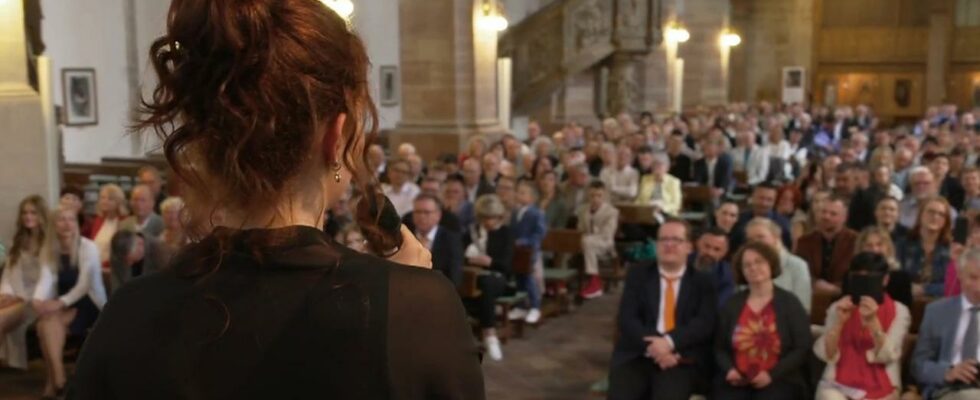In the middle
The Jugendweihe is still popular in eastern Germany. However, a new form of ritualized farewell to childhood has been booming in Halle for some time now: the “celebration of the turning point in life”.
There is a hustle and bustle in the stone room directly behind the entrance to the Moritzkirche in Halle. About fifteen young people formed a circle. One by one they take out cuddly toys, colorful pillows or books that they have brought with them from a large box. They are childhood memories or “childhood treasures” as Daniel Richter calls them, which they are supposed to symbolically hand over in two weeks at their “celebration of the change in life”.
“Today’s second meeting is about what gave you stability in the past. But you have the treasure of your childhood with you,” he explains. Daniel Richter is a youth education officer for the Diocese of Magdeburg and leads the “Celebration of the Transition of Life” project.
One by one everyone tells about their connection. Kolja brought a stuffed rabbit with him that has accompanied him since he started school: “When I was sad, I cuddled with it and it cheered me up.” Paula, on the other hand, brought a children’s book that inspired her to read.
The church opens up new circles
Today’s Auxiliary Bishop Reinhard Hauke in Erfurt had the idea to celebrate the turning point in life in 1997. He wanted to create a celebration for young people who attended Catholic schools but did not belong to any religious denomination. Today the turning point in life can be celebrated not only in Erfurt, but also in Berlin, Magdeburg and Halle. There it is increasingly developing into an ecumenical alternative to the existing secular offering of youth consecration.
The diocese of Magdeburg is cooperating with the Protestant Church of Central Germany. This year alone, 700 young people are taking part in Halle, and 840 have already registered for the next one. The celebrations take place in small groups, which often come from different schools and only get to know each other at the preparatory meetings.
A ritual for saying goodbye to childhood
“Rituals are a basic human need. They provide orientation and support in phases where upheaval takes place,” says Richter. It’s not just about a celebration as a ritual for saying goodbye to childhood, but above all about the preparatory events in which the young people deal with themselves, their friendships, their future wishes and help shape the celebration itself.
But that is not crucial for everyone. “My sister has made a change in her life and I generally take her as a role model,” says Nora. “And I think it’s nice to celebrate in a church. I’m not that religious, so Konfi wasn’t for me.”
Paula, on the other hand, didn’t think much about it at first: “My parents didn’t force me to do it, but they just kind of wanted me to celebrate it,” she says with a laugh. Some in the church criticize that the change in life could abolish the church’s own offerings such as confirmation or confirmation. Daniel Richter simply replies that young people can do both if they and their families want.
Alphaville meets organ
Two weeks later, on a Saturday afternoon, the Moritzkirche is completely full. The young people have dressed up, wearing glittery dresses and colorful suits. “Forever Young” by Alphaville can be heard on the organ. After a ceremonial procession, the young people introduce themselves to each other.
Then, one after the other, they place their childhood treasures in a chest with a few words and accept the burning candle with their wishes for the future. “I hope that when I grow up I’m even half as successful, ambitious and fearless as my mom and that my mom, dad and grandparents can watch me grow up for a long time,” says Nora.
“Peace, freedom, health, love, happiness and hope,” Paula wishes. “I also want to spend a lot of time with the people I love and care about, such as my family and friends.”
So far mainly in eastern Germany
The celebration lasts about an hour and a half. Daniel Richter and a group of parents also give a speech and there is music. At the end, all young people receive a blessing and their families present them with a rose. Afterwards we continue in the courtyard of the Moritzkirche with a champagne reception and photos. Many have tears in their eyes and hug each other.
So far, the “change of life celebration” has existed as an alternative to the youth consecration, especially in eastern Germany. Daniel Richter hopes that at some point it will be offered by churches across Germany. Next year, a turning point in life will be celebrated for the first time in Hanover.

